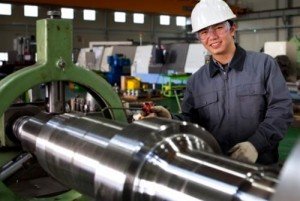 Metal and plastic machine workers are the workers that maintain, set up and operate equipment that create metal and plastic components. This is skilled labor that usually does not require higher education, and it can be an excellent position for those that find that they are more detail-oriented than most. A metal and plastic machine worker is required to be very conscientious and very thorough. Components which are created by these machines usually need to be very precise, which means the employees responsible for the operation of these machines cannot produce substandard work.
Metal and plastic machine workers are the workers that maintain, set up and operate equipment that create metal and plastic components. This is skilled labor that usually does not require higher education, and it can be an excellent position for those that find that they are more detail-oriented than most. A metal and plastic machine worker is required to be very conscientious and very thorough. Components which are created by these machines usually need to be very precise, which means the employees responsible for the operation of these machines cannot produce substandard work.
According to the Bureau of Labor Statistics, a metal and plastic machine worker has a median pay of $31,910 per year or $15.34 per hour. Most of those within this position only have a high school diploma or a GED, and throughout the nation there are a total of 939,700 metal and plastic machine workers. The job outlook shows that the field is expected to grow throughout the next decade, though the growth might be a little slower than average. In large part, this is due to much of the manufacturing in the country being moved over seas.
What Do Metal and Plastic Machine Workers Do? $31,910
High School or GED
None
939,700
6%
56,100 SOURCE: US Bureau of Labor Statistics
High School or GED
None
939,700
6%
56,100
A metal and plastic machine worker will usually work in a specific factory that is responsible for the manufacturing of specific objects. The workers will monitor and set up the machinery that creates these items and ensure that they are managed in a safe way and that nothing unusual occurs throughout the operation. Many machine workers will load materials into the machine so that the machine can create the components.
Metal and plastic machine work can include casting, molding and core making. The specifics of a machine worker’s job will depend on the types of item that they are creating and the equipment they are using to create them. Overall, however, the machine worker is responsible for the end product of the machine. They need to be able to identify and troubleshoot any issues that come up with the machine and they need to be able to inspect the end product for quality and consistency. They also need to be able to perform the regular upkeep and maintenance on the machines as necessary.
How Do You Become a Metal or Plastic Machine Worker?
Most machine workers will simply need a high school diploma to begin, though even this is not a necessity. Those that have a good background in math, science or engineering will usually be given preference over other applicants. Machine operators are trained on the job, which means they do not need to go to trade school or get any form of certification. The actual on the job training will usually only take a matter of weeks rather than month.
There are some certifications that are available for those that want to progress at a faster pace than others or those that might wish to acquire a job in a separate but related field. The National Institute for Metalworking Skills maintains 52 skill certifications that are related to machine working and other similar industries.
How Do You Advance as a Metal or Plastic Machine Worker?
Advancement in this industry usually means advancement within the company in which an employee works, which usually requires experience and reliability. Eventually, workers may be able to move into more skilled employment, such as the maintenance of industrial machinery. Machinists, tool and die makers and millwrights are all other related occupations that a machine worker could go into if they desire advancement. Otherwise, machine workers that prove themselves have the ability to go on and to become a supervisor of other workers or even eventually create and own their own company.